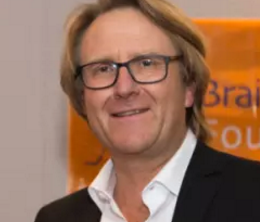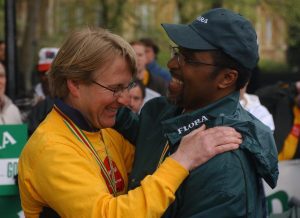A message from Peter Hamlyn
Brain & Spine Foundation Founder and President

The brain and its spine are our most precious possessions: they are where and how we live. Yet, 31 years after setting up the Brain & Spine Foundation, I am dismayed that the UK is still so woefully under-resourced in this key area of public health. 1-in-6 people in the UK are living with a neurological condition – that is more than cancer, heart disease and kidney failure combined. From spina bifida to meningitis, head injury, stroke and dementia, they affect all ages.
And yet, the provision of specialist treatment and care remains so appallingly low.
Take one example, head injury, one of the biggest killers of young people; more patients suffering a head injury, serious enough to require admission to hospital, have that care provided by orthopaedic surgeons rather than a neurosurgeon! In the UK it is the minority of people that ever see a neurologist after a stroke. This does not happen for broken bones or broken hearts, just broken brains.
To me this is a scandal. For patients it is all too often a needless tragedy.
Today our cause is as clear and compelling as ever; Neuro must be visible and recognised as a serious public health issue. As a community we are all Neuro Changemakers. Together, let’s take action today.
Our history

Neurosurgeon Peter Hamlyn, renowned for his role in saving the life of professional boxer Michael Watson, and Professor Sid Watkins, the much-loved pioneer of modern motorsports medicine and safety, establish the British Brain & Spine Foundation together with a group of other leading neurologists and neurosurgeons. The Foundation aims to improve the quality of life for people with neurological disorders and to reduce neurological disability by providing a national focus for research, education and information.
Following 3 years of fundraising, the Foundation’s first research projects begin. From 1995 to 2002, the Foundation spends over £1 million on 15 research fellowships and projects, fostering significant successes. Research focuses on conditions such as head injury and brain tumours that are not covered by other ‘condition specific’ charities.
A free Brain & Spine Helpline is established, staffed by nurses and other health professionals who have specialised in neuroscience. The Helpline covers all brain and spine conditions, from the fairly common to the very rare, and can offer information and support on any related issue.
In partnership with the Royal College of General Practitioners and the University of Bath, the Foundation introduces a distance learning package to help improve the skills of GPs in neurology. The programme, Update in Neurology, is CD-ROM based and GPs can communicate with their tutors by email.
The charity drops “British” from its name to become the Brain & Spine Foundation. The new name represents the evolution in the range of services offered since the charity’s launch, with a helpline, a range of information booklets and new website now available. It also reflects the international availability of the service.

Former boxer Michael Watson launches the Foundation into the media spotlight when he undertakes his “biggest fight” to complete the Flora London Marathon in 6 days, 2 hours, 27 minutes and 17 seconds, following a career-ending head injury sustained during a title fight with Chris Eubank. According to his neurosurgeon and good friend (and founder of the Brain & Spine Foundation) Peter Hamlyn, Michael’s marathon amounts to “12 years, 6 operations, 3 hospitals, 26 miles and 385 yards.” He raises £250,000 in aid of our charity.
Children with brain tumours and their parents collaborate with the Brain & Spine Foundation to produce a brand new multimedia information resource called Headstrong, which is launched at the Science Museum in London.
The Brain & Spine Helpline moves its services online with a new website and online discussion forum. For the first time, patients can post their questions on an online forum and interact with other people going through similar experiences.
During Brain Awareness Week, the Foundation launches the Information Access Toolkit, an online solution for health and social care professionals to meet the information needs of people affected by neurological conditions.
All About Brain Injury is a new website designed for young people aged between 13 and 19 who are affected by acquired brain injury (ABI). The website explains the causes of different types of brain injury and offers practical advice about coping with school, family, friends and more.
With the help of a grant from the Big Lottery Fund, a new series of booklets and fact sheets is published by the Brain & Spine Foundation, providing expert medical information to people affected by neurological disorders. The publications carry the Information Standard, a new quality mark from the Department of Health, and by 2011 they are being downloaded by 100,000 people each year.
There are now over three quarters of a million people visiting the website each year, accessing information and downloading publications. For many, reading a website or booklet is all that’s needed, but often people also need to talk, ask questions and be reassured. Our Helpline responds to 3,500 requests for information each year, by telephone, email and post.
Three new booklets are produced: ‘Subarachnoid Haemorrhage‘, ‘Dizziness and Balance Problems‘ and ‘Head Injury‘, as well as numerous fact sheets on topics such as ‘Meningitis’ and ‘Chiari Malformations’. View all of our Health Information publications here.
This year is a milestone for BSF as we organise the UK’s first conference on Subarachnoid Haemorrhage dedicated for patients and carers. We hold a Gala Dinner at the Royal College of Surgeons focusing on generating awareness on head injury in sport. This year BSF also works on a couple of video resources on head injury [LINK] as part of the charity’s commitment to expand the way we offer specialised information through different media channels.
The charity celebrates 25 years! We organise a conference on Chiari malformation and associated conditions, such as syringomyelia, at Queen Square. During the year, 3029 people benefit from our one-to-one expert support and 101,940 booklets and fact sheets are distributed. The charity also launches its first-ever app, aimed at young people affected by brain injury. For the first time in the charity’s history, Brain & Spine Foundation raises £1 million, enabling us to support many more people affected by neurological problems.
In response to the COVID-19 pandemic, the Brain & Spine Foundation launch new online peer support programmes to help tackle loneliness and isolation during lockdown for people affected by neurological conditions.
We committed to being a changemaker organisation, a catalyst for transformational change. In partnership with our community, and organisations that share our vision, we have created 3 interconnected programmes. Building on the foundation of our highly respected Professional Neuro Services, we have added Social Research (NeuroLifeNow), and Building Community (Neuro Changemakers) – to provide a holistic solution for people affected by any neurological condition.
We take an exponential leap in communications to build our public profile and influence to achieve our organisational goal: put Neuro on the map so that it is prioritised as a serious public health issue. Our website, which sees over 600,000 visits every year, is re-launched.
Brain & Spine Foundation is awarded a £330,000 grant over 3 years from The National Lottery Community Fund. The funding enables the charity to develop our social research platform NeuroLifeNow and expand our Professional Neuro Services. The grant will drive change for our community, improve quality of life across England, and strengthen our partnership with the Neurological Alliance.